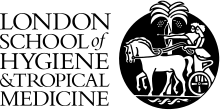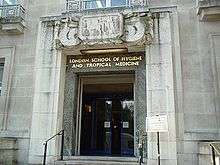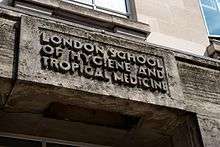London School of Hygiene & Tropical Medicine
 | |
| Type | Public |
|---|---|
| Established |
1899 - London School of Tropical Medicine 1924 - London School of Hygiene & Tropical Medicine established by Royal Charter |
| Chancellor | HRH The Princess Royal (University of London) |
| Director | Peter Piot |
Administrative staff | 766 (full-time equivalent) |
| Students | 1,245 (2014/15)[1] |
| Location | Bloomsbury, London, United Kingdom |
| Campus | Urban |
| Affiliations | University of London |
| Website |
www |
The London School of Hygiene & Tropical Medicine (informally the LSHTM) is a public research university on Keppel Street, Bloomsbury, Camden, London, and specialised in public health and tropical medicine and a constituent college of the University of London. It was founded by Sir Patrick Manson in 1899 and is one of the most prestigious institutions in the world in the fields of public health and infectious diseases, ranking highly in both national and international league tables.
The LSHTM's mission is to contribute to the improvement of health worldwide through the pursuit of excellence in research, postgraduate teaching and advanced training in national and international public health and tropical medicine, and through informing policy and practice in these areas. It had a total income of £101.7 million in 2009/10, of which £62.5 million was from research grants and contracts.[2]
History
.jpg)
The school was founded in 1899 by Sir Patrick Manson as the London School of Tropical Medicine and located at the Albert Dock Seamen's Hospital in the London Docklands.[3] Just prior to this teaching in tropical medicine had been commenced in 1899 at the Extramural school at Edinburgh and even earlier at London's Livingstone College founded in 1893 by Charles F. Harford-Battersby (1865–1925). Before giving lectures at St George's Hospital, London, in 1895, Livingstone College afforded Manson his first opportunity to teach courses in tropical medicine.[4] Manson's early career was as a physician in the Far East where he deduced the correct etiology of filariasis, a parasitic vector based disease, transmitted through the bite of a mosquito. On his return to London, he was appointed Medical Advisor to the Colonial Office. He strongly believed that doctors should be trained in tropical medicine to treat British colonial administrators and others working throughout Britain's tropical empire. He also encouraged and mentored Ronald Ross during this period to uncover the correct etiology of malaria, which Ross subsequently discovered in 1897, winning the Nobel Prize for his efforts. The original school was established as part of the Seamen's Hospital Society.
In 1920 the school moved, with the Hospital for Tropical Diseases, to Endsleigh Gardens in central London, taking over a former hotel which had been used as a hospital for officers during the First World War.[5] In 1921 the Athlone Committee recommended the creation of an institute of state medicine, which built on a proposal by the Rockefeller Foundation to develop a London-based institution that would lead the world in the promotion of public health and tropical medicine. This enlarged school, now named the London School of Hygiene & Tropical Medicine was granted its Royal Charter in 1924.
The school moved to its present location in Gower Street in 1929.
The school is London University's major resource for postgraduate teaching and research in public health and tropical medicine. On successful completion of their studies, students gain a University of London degree.
Building
A competition to design a new school building to be sited in Gower Street, was held involving five architects, all experienced in laboratory design and construction. This was won in 1925 by Morley Horder and Verner Rees who located the main entrance in Keppel Street. This building was opened in 1929 by HRH the Prince of Wales. The purchase of the site and the cost of a new building was made possible through a gift of $2m from the Rockefeller Foundation.
Academics


Faculties
Faculty of Epidemiology and Population Health
The Faculty of Epidemiology and Population Health aims to be a methodological centre of excellence for research in national and global health issues, to expand the limits of epidemiological thinking & multi-disciplinary research to further understanding of health issues in their full complexity, to develop, refine and disseminate tools & methods for research design, data collection, analysis and evaluation, and to conduct rigorous research in national and global health. Research publications for the Faculty can be found in LSHTM Research Online and datasets are available through LSHTM Data Compass.
The Faculty has expertise in:
- Clinical trials
- Analysis of routinely collected statistics
- Indirect techniques for measuring mortality in developing countries
- Conduct and analysis of observational studies
- Large-scale field trials
- Design and evaluation of interventions
- National and global health
Faculty of Infectious and Tropical Diseases
The Faculty of Infectious and Tropical Diseases (ITD) was formed in August 1997 and encompasses all of the laboratory-based research in the School as well as that on the clinical and epidemiological aspects of infectious and tropical diseases. It is currently headed by Simon Croft, who is Professor of Parasitology. The Faculty is organised into four large research departments. The range of disciplines represented in the faculty is very broad and inter-disciplinary research is a feature of much of its activity. Research publications for the Faculty can be found in LSHTM Research Online and datasets are available through LSHTM Data Compass.
The spectrum of diseases studied is wide and there are major research groups working on topics which include:
- HIV/AIDS and other sexually transmitted diseases
- malaria and other vector borne diseases
- tuberculosis
- vaccine development and evaluation
- vector biology and disease control
There is close interaction between scientists in different research teams. The Faculty has strong overseas links which provide a basis for field studies and international collaborations in developed and developing countries. Funding for research in the Faculty comes from around 45 funding organizations and agencies. Major funders of research include the Department for International Development, Medical Research Council, Wellcome Trust, BBSRC, GlaxoSmithKline and the Commission of European Communities.
Faculty of Public Health and Policy

The Faculty of Public Health and Policy aims to improve global health through research, teaching and the provision of advice in the areas of health policy, health systems and services, and individual, social and environmental influences on health. Interests and activities embrace the health needs of people living in countries at all levels of development. The School has the largest numbers of research active staff in the areas of epidemiology, public health and health services research in the UK.[6] The Faculty of Public Health and Policy has over 220 members of staff, including epidemiologists, public health physicians, economists, policy analysts, anthropologists, sociologists, historians, psychologists, statisticians and mathematicians. The Faculty's research programmes, with an annual spend of over £7m, focus on public health problems of importance both globally and in the UK, and build on an extensive network of collaborations.[7]
The research programmes exploit multidisciplinary and multi-method approaches, generate new knowledge for specific contexts and test transferability to different settings, and engage with policymakers and providers of health care to ensure research is relevant and translated into practice.
The Faculty hosts School Centres in the areas of History in Public Health,[8] Research on Drugs and Health Behaviours, Spatial Analysis in Public Health, Global Change and Health, Health of Societies in Transition (ECOHOST), and Gender Violence and Health. In addition, staff participate in Centres based in other departments, notably the Malaria Centre and the Centre for the Mathematical Modelling of Infectious Disease.
In keeping with its focus on the interface between scientific research, policy and practice, faculty staff are engaged in a very wide range of policy-influencing roles, including membership of key government advisory groups, leadership of professional bodies, membership of research funding bodies, and provision of expert advice to global health institutions. Research publications for the Faculty can be found in LSHTM Research Online and datasets are available through LSHTM Data Compass.
Research centres
The School is currently home to the following research centres:
- Centre for the Evaluation of Public Health Interventions
- Centre on Global Change and Health
- European Centre on Health of Societies in Transition (ECOHOST)
- Gender Violence & Health Centre
- Malaria Centre
- MARCH Centre for Maternal, Reproductive & Child Health
- Clinical Trials Unit
- Centre for Global Mental Health
- Bloomsbury Centre for Genetic Epidemiology and Statistics
- Centre for Disability and Development
- Centre for Statistical Methodology
- Centre for History in Public Health, London School of Hygiene and Tropical Medicine
- Hygiene Centre
- Centre for the Mathematical Modelling of Infectious Diseases
- Centre for Research on Drugs and Health Behaviour
- International Centre for Eye Health
- Wellcome Bloomsbury Centre
Teaching and research programmes
All three Faculties offer a wide range of MSc courses and Research Degrees. LSHTM offers a range of taught master's degrees as well as research degrees leading to the University of London degree of DrPH, MPhil and PhD.
Awards
The LSHTM won the 2009 Gates Award for Global Health established by the Bill & Melinda Gates Foundation and received $1 million in prize money. The award recognises organizations that have made an outstanding contribution to improving global health.
More recently, a team of researchers led by Professor Richard Hayes at the London School of Hygiene & Tropical Medicine, have been awarded $37 million to test an innovative combination of strategies to prevent HIV in African countries.
Donald Reid Medal
The Donald Reid Medal is awarded triennially by the LSHTM in recognition of distinguished contributions to epidemiology.[9]
Rankings
In 2008, the UK Research Assessment Exercise (RAE) confirmed the School as a world leading centre for research. The School has been ranked one of the top three research institutions in the UK in the Times Higher Education Table of Excellence, which is based on the 2008 Research Assessment Exercise. The London School of Hygiene & Tropical Medicine has been ranked top university in Europe for research impact in all fields (ahead of Oxford and Cambridge) in the 2015 CWTS Leiden Ranking. The School is also ranked 6th overall in the world for impact based on the top 1% of published papers in all fields (after MIT, Harvard, Caltech, Stanford and Berkeley), 3rd in the world for biomedical and health sciences (after only MIT and Caltech) and 5th in the world overall for collaborative research - See more at: http://blogs.lshtm.ac.uk/news/2015/07/22/school-tops-research-league-tables-in-2015-leiden-ranking/#sthash.KJSFL35h.dpuf
The School is now highly rated in a number of world rankings. In November 2014, it was ranked 91st of all universities in the world by US News Best Global Universities Rankings. In the four subject rankings in which it appeared, it ranked #26 in clinical medicine, 17th in immunology, 42nd in microbiology, and 3rd in the world, after Harvard and Johns Hopkins, for social science and public health - See more at: http://blogs.lshtm.ac.uk/news/2015/07/22/school-tops-research-league-tables-in-2015-leiden-ranking/#sthash.KJSFL35h.dpuf
Therefore, on the basis of the current relevant world rankings of institutions of public health, LSHTM remains one of the most prestigious postgraduate institutions in public health globally.
Notable people
References
- ↑ "2014/15 Students by HE provider, level, mode and domicile" (XLSX). Higher Education Statistics Agency. Retrieved 19 January 2016.
- ↑ "Wealth and Health: Financial data for UK higher education institutions, 2009–10". Times Higher Education. 7 April 2011. Retrieved 15 December 2011.
- ↑ Cook GC, Webb AJ (2001). "The Albert Dock Hospital, London: the original site (in 1899) of Tropical Medicine as a new discipline". Acta Trop 79 (3): 249–55. doi:10.1016/S0001-706X(01)00127-9. PMID 11412810.
- ↑ Johnson, Ryan (1910)Colonial Mission and Imperial Tropical Medicine: Livingstone College, London, 1893–1914, Social History of Medicine Volume23, Issue3 Pp. 549-566
- ↑ "Albert Dock Seamen's Hospital". Archives in London and the M25 area (AIM25). External link in
|publisher=(help) - ↑ RAE 2008
- ↑ LSHTM Annual Report 2008
- ↑ Centre for History in Public Health,London School of Hygiene and Tropical Medicine, http://history.lshtm.ac.uk/
- ↑ London School of Hygiene and Tropical Medicine, Report on the Work of the School 1977-1978, page 21, 1978, (London:London School of Hygiene and Tropical Medicine)
Further reading
- Lise Wilkinson and Anne Hardy, Prevention and cure: the London School of Hygiene & Tropical Medicine: a 20th century quest for global public health, Kegan Paul Limited, 2001, ISBN 0-7103-0624-5
- G.D. Hale Carpenter joined the London School of Hygiene and Tropical Medicine, and took the DM in 1913 with a dissertation on the tsetse fly (Glossina palpalis) and sleeping sickness. He published: A Naturalist on Lake Victoria, with an Account of Sleeping Sickness and the Tse-tse Fly; 1920. T.F. Unwin Ltd, London; Biodiversity Archive
External links
- London School of Hygiene & Tropical Medicine website
- LSHTM Research Online
- Chronology
- The History of Higher Education in Bloomsbury and Westminster London School of Hygiene & Tropical Medicine entry
- London School of Hygiene and Tropical Medicine student lists
- Bug Central: inside the London School of Hygiene and Tropical Medicine
| ||||||||||||||||||||||||||||||||
| ||||||||||||||||||||||||||||||||||||||||||||||||||||||||||
Coordinates: 51°31′15″N 0°07′51″W / 51.5209°N 0.1307°W
